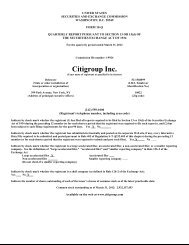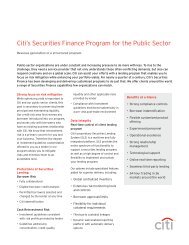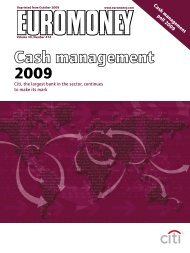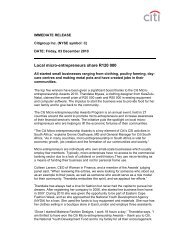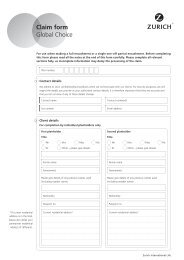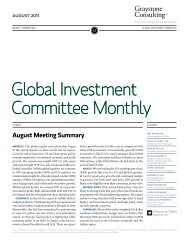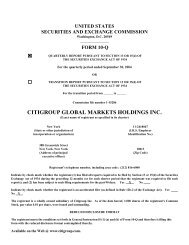While <strong>Citigroup</strong> has determined that the integrity of its current foreclosureprocess is sound and there are no systemic issues, in the event deficienciesmaterialize, or if there is any adverse industry-wide regulatory or judicialaction taken with respect to mortgage foreclosures, the costs associated with<strong>Citigroup</strong>’s mortgage operations could increase significantly and <strong>Citigroup</strong>’sability to continue to implement its current foreclosure processes could beadversely affected.Any increase or backlog in the number of foreclosures in process, whetherrelated to Citi foreclosure process issues or industry-wide efforts to prevent orforestall foreclosure, has broader implications for <strong>Citigroup</strong>’s U.S. Consumermortgage portfolios. Specifically, to the extent that <strong>Citigroup</strong> is unable to takepossession of the underlying assets and sell the properties on a timely basis,growth in the number of foreclosures in process could:• inflate the amount of 180+ day delinquencies in <strong>Citigroup</strong>’s mortgagestatistics;• increase Consumer non-accrual loans (90+ day delinquencies);• create a dampening effect on Citi’s net interest margin as non-accrualassets build on the balance sheet;• negatively impact the amounts ultimately realized for property subject toforeclosure; and• cause additional costs to be incurred in connection with legislative orregulatory investigations.Further, any increase in the time to complete foreclosure sales may resultin an increase in servicing advances and may negatively impact the valueof <strong>Citigroup</strong>’s MSRs and mortgage-backed securities, in each case due toan adverse change in the expected timing and/or amount of cash flows tobe received.The continued uncertainty relating to the sustainabilityand pace of economic recovery has adversely affected, andmay continue to adversely affect, <strong>Citigroup</strong>’s businessesand results of operations.The financial services industry and the capital markets have been, and maycontinue to be, adversely affected by the economic recession and continueddisruptions in the global financial markets. This continued uncertaintyand disruption has adversely affected, and may continue to adversely affect,the corporate and sovereign bond markets, equity markets, debt and equityunderwriting and other elements of the financial markets. Volatile financialmarkets and reduced (or only slightly increased) levels of client businessactivity may continue to negatively impact <strong>Citigroup</strong>’s business, capital,liquidity, financial condition and results of operations, as well as the tradingprice of <strong>Citigroup</strong>’s common stock, preferred stock and debt securities.In addition, there has recently been increased focus on the potential forsovereign debt defaults and/or significant bank failures in the Eurozone.Despite assistance packages to Greece and Ireland, and the creation inMay 2010 of a joint EU-IMF European Financial Stability Facility, yieldson government bonds of certain Eurozone countries, including Portugaland Spain, have continued to rise. There can be no assurance that themarket disruptions in the Eurozone, including the increased cost of fundingfor certain Eurozone governments, will not spread, nor can there be anyassurance that future assistance packages will be available or sufficientlyrobust to address any further market contagion in the Eurozone or elsewhere.Moreover, market and economic disruptions have affected, and maycontinue to affect, consumer confidence levels and spending, personalbankruptcy rates, levels of incurrence and default on consumer debt(including strategic defaults on home mortgages) and home prices, amongother factors, particularly in Citi’s North America Consumer businesses.Combined with persistently high levels of U.S. unemployment, as wellas any potential future regulatory actions, these factors could result inreduced borrower interaction and participation in Citi’s loss mitigationand modification programs, particularly Citi’s U.S. mortgage modificationprograms, or increase the risk of re-default by borrowers who have completeda modification, either of which could increase Citi’s net credit losses anddelinquency statistics. To date, asset sales and modifications under Citi’smodification programs, including the U.S. Treasury’s Home AffordableModification Program (HAMP), have been the primary drivers of improvedperformance within <strong>Citigroup</strong>’s U.S. Consumer mortgage portfolios (see“Managing Global Risk—Credit Risk—U.S. Consumer Mortgage Lending”and “Consumer Loan Modification Programs” below). To the extentuncertainty regarding the economic recovery continues to negatively impactconsumer confidence and the consumer credit factors discussed above, Citi’sbusinesses and results of operations could be adversely affected.The maintenance of adequate liquidity depends onnumerous factors outside of Citi’s control, including butnot limited to market disruptions and regulatory andlegislative liquidity requirements, and Citi’s need tomaintain adequate liquidity has negatively impacted,and may continue to negatively impact, its net interestmargin (NIM).Adequate liquidity is essential to <strong>Citigroup</strong>’s businesses. As seen in recentyears, <strong>Citigroup</strong>’s liquidity can be, and has been, significantly and negativelyimpacted by factors <strong>Citigroup</strong> cannot control, such as general disruption ofthe financial markets, negative views about the financial services industryin general, or <strong>Citigroup</strong>’s short-term or long-term financial prospects orperception that it is experiencing greater liquidity or financial risk. Moreover,<strong>Citigroup</strong>’s ability to access the capital markets and its cost of obtaininglong-term unsecured funding is directly related to its credit spreads inboth the cash bond and derivatives markets, also outside of its control.Credit spreads are influenced by market and rating agency perceptions of<strong>Citigroup</strong>’s creditworthiness and may also be influenced by movements in thecosts to purchasers of credit default swaps referenced to <strong>Citigroup</strong>’s long-termdebt. <strong>Inc</strong>reases in <strong>Citigroup</strong>’s credit qualifying spreads can, and did duringthe financial crisis, significantly increase the cost of this funding.Further, the prospective regulatory liquidity standards for financialinstitutions are currently subject to rulemaking and change, both in the U.S.and internationally, resulting in uncertainty as to their ultimate scope andeffect. In particular, the Basel Committee has developed two quantitativemeasures intended to strengthen liquidity risk management and supervision:76
a short-term Liquidity Coverage Ratio (LCR) and a long-term, structuralNet Stable Funding Ratio (NSFR). The LCR, which will become a minimumrequirement on January 1, 2015, is designed to ensure banking organizationsmaintain an adequate level of unencumbered cash and high qualityunencumbered assets that can be converted into cash to meet liquidity needs.The NSFR, which will become a minimum requirement by January 1, 2018,is designed to promote the medium- and long-term funding of assets andactivities over a one-year time horizon. The LCR must be at least 100%, whilethe NSFR must be greater than 100%.Citi may not be able to maintain adequate liquidity in light of theliquidity standards proposed by the Basel Committee or other regulatorsin the U.S. or abroad, or Citi’s costs to maintain such liquidity levels mayincrease. For example, Citi could be required to increase its long-termfunding to meet the NSFR, the cost of which could also be negatively effectedby the regulatory requirements aimed at facilitating the orderly resolutionof financial institutions. Moreover, <strong>Citigroup</strong>’s ability to maintain andmanage adequate liquidity is dependent upon the continued economicrecovery as well as the scope and effect of any other legislative or regulatorydevelopments or requirements relating to or impacting liquidity.During 2010, consistent with its strategy, <strong>Citigroup</strong> continued to divestrelatively higher yielding assets from Citi Holdings. The desire to maintainadequate liquidity continued to cause <strong>Citigroup</strong> to invest its available fundsin lower-yielding assets, such as those issued by the U.S. government. As aresult, during 2010, the yields across both the interest-earning assets and theinterest-bearing liabilities continued to remain under pressure. The lowerasset yields more than offset the lower cost of funds, resulting in continuedlow NIM. There can be no assurance that <strong>Citigroup</strong>’s NIM will not continueto be negatively impacted by these factors.<strong>Citigroup</strong>’s ability to utilize its DTAs to offset futuretaxable income may be significantly limited if itexperiences an “ownership change” under the InternalRevenue Code.As of December 31, 2010, <strong>Citigroup</strong> had recognized net DTAs ofapproximately $52.1 billion, which are included in its tangible commonequity. <strong>Citigroup</strong>’s ability to utilize its DTAs to offset future taxable incomemay be significantly limited if <strong>Citigroup</strong> experiences an “ownership change”as defined in Section 382 of the Internal Revenue Code of 1986, as amended(Code). In general, an ownership change will occur if there is a cumulativechange in <strong>Citigroup</strong>’s ownership by “5-percent shareholders” (as defined inthe Code) that exceeds 50 percentage points over a rolling three-year period.A corporation that experiences an ownership change will generally besubject to an annual limitation on its pre-ownership change DTAs equalto the value of the corporation immediately before the ownership change,multiplied by the long-term tax-exempt rate (subject to certain adjustments),provided that the annual limitation would be increased each year to theextent that there is an unused limitation in a prior year. The limitationarising from an ownership change under Section 382 on <strong>Citigroup</strong>’s abilityto utilize its DTAs will depend on the value of <strong>Citigroup</strong>’s stock at the time ofthe ownership change. Under IRS Notice 2010-2, Citi did not experience anownership change within the meaning of Section 382 as a result of the salesof its common stock held by the U.S. Treasury.The value of Citi’s DTAs could be reduced if corporatetax rates in the U.S., or certain foreign jurisdictions,are decreased.There have been recent discussions in Congress and by the ObamaAdministration regarding potentially decreasing the U.S. corporate taxrate. In addition, the Japanese government has proposed reductions inthe national and local corporate tax rates by 4.5% and 0.9%, respectively,which could be enacted as early as the first or second quarter of 2011. While<strong>Citigroup</strong> may benefit in some respects from any decreases in these corporatetax rates, any reduction in the U.S. corporate tax rate would result in adecrease to the value of Citi’s DTAs, which could be significant. Moreover, ifthe legislation in Japan is enacted as proposed, it would require Citi to takean approximate $200 million charge in the quarter in which the legislationis so enacted.The expiration of a provision of the U.S. tax law that allows<strong>Citigroup</strong> to defer U.S. taxes on certain active financingincome could significantly increase Citi’s tax expense.<strong>Citigroup</strong>’s tax provision has historically been reduced because activefinancing income earned and indefinitely reinvested outside the U.S. istaxed at the lower local tax rate rather than at the higher U.S. tax rate.Such reduction has been dependent upon a provision of the U.S. tax lawthat defers the imposition of U.S. taxes on certain active financing incomeuntil that income is repatriated to the U.S. as a dividend. This “activefinancing exception” is scheduled to expire on December 31, 2011, andwhile it has been scheduled to expire on numerous prior occasions and hasbeen extended each time, there can be no assurance that the exception willcontinue to be extended. In the event this exception is not extended beyond2011, the U.S. tax imposed on Citi’s active financing income earned outsidethe U.S. would increase after 2011, which could further result in Citi’s taxexpense increasing significantly.<strong>Citigroup</strong> may not be able to continue to wind down CitiHoldings at the same pace as it has in the past two years.While <strong>Citigroup</strong> intends to dispose of or wind down the Citi Holdingsbusinesses as quickly as practicable yet in an economically rational manner,and while Citi made substantial progress towards this goal during 2009and 2010, Citi may not be able to dispose of or wind down the businesses orassets that are part of Citi Holdings at the same level or pace as in the pasttwo years. BAM primarily consists of the MSSB JV, pursuant to which MorganStanley has call rights on Citi’s ownership interest in the venture over athree-year period beginning in 2012. Of the remaining assets in SAP, as ofDecember 31, 2010, approximately one-third are held-to-maturity. In LCL,approximately half of the remaining assets consist of U.S. mortgages as ofDecember 31, 2010, which will run off over time, and larger businesses suchas CitiFinancial. As a result, Citi’s ability to simplify its organization maynot occur as rapidly as it has in the past. In addition, the ability of <strong>Citigroup</strong>to continue to reduce its risk-weighted assets or limit its expenses through,among other things, the winding down of Citi Holdings may be adverselyaffected depending on the ultimate pace or level of Citi Holdings businessdivestitures, portfolio run-offs and asset sales.77
- Page 1 and 2:
UNITED STATESSECURITIES AND EXCHANG
- Page 3 and 4:
CITIGROUP’S 2010 ANNUAL REPORT ON
- Page 5 and 6: As described above, Citigroup is ma
- Page 7 and 8: Operating ExpensesCitigroup operati
- Page 9 and 10: FIVE-YEAR SUMMARY OF SELECTED FINAN
- Page 11 and 12: CITIGROUP REVENUESIn millions of do
- Page 13 and 14: REGIONAL CONSUMER BANKINGRegional C
- Page 15 and 16: 2009 vs. 2008Revenues, net of inter
- Page 17 and 18: 2009 vs. 2008Revenues, net of inter
- Page 19 and 20: 2009 vs. 2008Revenues, net of inter
- Page 21 and 22: 2009 vs. 2008Revenues, net of inter
- Page 23 and 24: SECURITIES AND BANKINGSecurities an
- Page 25 and 26: TRANSACTION SERVICESTransaction Ser
- Page 27 and 28: BROKERAGE AND ASSET MANAGEMENTBroke
- Page 29 and 30: Japan Consumer FinanceCitigroup con
- Page 31 and 32: The following table provides detail
- Page 33 and 34: CORPORATE/OTHERCorporate/Other incl
- Page 35 and 36: During 2010, average Consumer loans
- Page 37 and 38: SEGMENT BALANCE SHEET AT DECEMBER 3
- Page 39 and 40: Citigroup Regulatory Capital Ratios
- Page 41 and 42: Capital Resources of Citigroup’s
- Page 43 and 44: Regulatory Capital Standards Develo
- Page 45 and 46: DepositsCiti continues to focus on
- Page 47 and 48: Secured financing is primarily cond
- Page 49 and 50: Each of the credit rating agencies
- Page 51 and 52: RISK FACTORSThe ongoing implementat
- Page 53 and 54: The emerging markets in which Citi
- Page 55: is largely uncertain. However, any
- Page 59 and 60: understanding or cause confusion ac
- Page 61 and 62: MANAGING GLOBAL RISKRISK MANAGEMENT
- Page 63 and 64: CREDIT RISKCredit risk is the poten
- Page 65 and 66: [This page intentionally left blank
- Page 67 and 68: (1) 2010 primarily includes an addi
- Page 69 and 70: Non-Accrual Loans and AssetsThe tab
- Page 71 and 72: Renegotiated LoansThe following tab
- Page 73 and 74: Citi’s first mortgage portfolio i
- Page 75 and 76: Consumer Mortgage FICO and LTVData
- Page 77 and 78: Second Mortgages: December 31, 2010
- Page 79 and 80: Interest Rate Risk Associated with
- Page 81 and 82: North America Cards—FICO Informat
- Page 83 and 84: CONSUMER LOAN DETAILSConsumer Loan
- Page 85 and 86: Consumer Loan Modification Programs
- Page 87 and 88: North America CardsNorth America ca
- Page 89 and 90: Payment deferrals that do not conti
- Page 91 and 92: Repurchase ReserveCiti has recorded
- Page 93 and 94: Securities and Banking-Sponsored Pr
- Page 95 and 96: The following table presents the co
- Page 97 and 98: MARKET RISKMarket risk encompasses
- Page 99 and 100: Trading PortfoliosPrice risk in tra
- Page 101 and 102: INTEREST REVENUE/EXPENSE AND YIELDS
- Page 103 and 104: AVERAGE BALANCES AND INTEREST RATES
- Page 105 and 106: ANALYSIS OF CHANGES IN INTEREST EXP
- Page 107 and 108:
[This page intentionally left blank
- Page 109 and 110:
As required by SEC rules, the table
- Page 111 and 112:
The credit valuation adjustment amo
- Page 113 and 114:
The fair values shown are prior to
- Page 115 and 116:
Key Controls over Fair Value Measur
- Page 117 and 118:
The following table reflects the in
- Page 119 and 120:
The results of the July 1, 2010 tes
- Page 121 and 122:
As a result of the losses incurred
- Page 123 and 124:
MANAGEMENT’S ANNUAL REPORT ON INT
- Page 125 and 126:
• an “ownership change” under
- Page 127 and 128:
REPORT OF INDEPENDENT REGISTERED PU
- Page 129 and 130:
FINANCIAL STATEMENTS AND NOTES TABL
- Page 131 and 132:
CONSOLIDATED FINANCIAL STATEMENTSCO
- Page 133 and 134:
CONSOLIDATED BALANCE SHEET(Continue
- Page 135 and 136:
CONSOLIDATED STATEMENT OF CHANGES I
- Page 137 and 138:
CITIBANK CONSOLIDATED BALANCE SHEET
- Page 139 and 140:
NOTES TO CONSOLIDATED FINANCIAL STA
- Page 141 and 142:
Repurchase and Resale AgreementsSec
- Page 143 and 144:
ecoveries are added. Securities rec
- Page 145 and 146:
Consumer Mortgage Representations a
- Page 147 and 148:
Transfers of Financial AssetsFor a
- Page 149 and 150:
ACCOUNTING CHANGESChange in Account
- Page 151 and 152:
The following table reflects the in
- Page 153 and 154:
Measuring Liabilities at Fair Value
- Page 155 and 156:
Revisions to the Earnings-per-Share
- Page 157 and 158:
FUTURE APPLICATION OF ACCOUNTING ST
- Page 159 and 160:
3. DISCONTINUED OPERATIONSSale of T
- Page 161 and 162:
CitiCapitalOn July 31, 2008, Citigr
- Page 163 and 164:
5. INTEREST REVENUE AND EXPENSEFor
- Page 165 and 166:
Stock Award ProgramsCitigroup issue
- Page 167 and 168:
In January 2009, members of the Man
- Page 169 and 170:
Information with respect to stock o
- Page 171 and 172:
9. RETIREMENT BENEFITSThe Company h
- Page 173 and 174:
The following table shows the chang
- Page 175 and 176:
A one-percentage-point change in th
- Page 177 and 178:
Level 3 Roll ForwardThe reconciliat
- Page 179 and 180:
10. INCOME TAXESIn millions of doll
- Page 181 and 182:
The Company is currently under audi
- Page 183 and 184:
11. EARNINGS PER SHAREThe following
- Page 185 and 186:
13. BROKERAGE RECEIVABLES AND BROKE
- Page 187 and 188:
The table below shows the fair valu
- Page 189 and 190:
Debt Securities Held-to-MaturityThe
- Page 191 and 192:
Evaluating Investments for Other-Th
- Page 193 and 194:
The following is a 12-month roll-fo
- Page 195 and 196:
16. LOANSCitigroup loans are report
- Page 197 and 198:
Residential Mortgage Loan to Values
- Page 199 and 200:
The following table presents Corpor
- Page 201 and 202:
Included in the Corporate and Consu
- Page 203 and 204:
18. GOODWILL AND INTANGIBLE ASSETSG
- Page 205 and 206:
Intangible AssetsThe components of
- Page 207 and 208:
CGMHI has committed long-term finan
- Page 209 and 210:
20. Regulatory CapitalCitigroup is
- Page 211 and 212:
22. SECURITIZATIONS AND VARIABLE IN
- Page 213 and 214:
In millions of dollars As of Decemb
- Page 215 and 216:
Funding Commitments for Significant
- Page 217 and 218:
Credit Card SecuritizationsThe Comp
- Page 219 and 220:
Managed Loans—Citi HoldingsThe fo
- Page 221 and 222:
Key assumptions used in measuring t
- Page 223 and 224:
Mortgage Servicing RightsIn connect
- Page 225 and 226:
The Company administers one conduit
- Page 227 and 228:
Key Assumptions and Retained Intere
- Page 229 and 230:
Municipal InvestmentsMunicipal inve
- Page 231 and 232:
Derivative NotionalsIn millions of
- Page 233 and 234:
activities together with gains and
- Page 235 and 236:
Cash Flow HedgesHedging of benchmar
- Page 237 and 238:
The range of credit derivatives sol
- Page 239 and 240:
24. CONCENTRATIONS OF CREDIT RISKCo
- Page 241 and 242:
Trading account assets and liabilit
- Page 243 and 244:
The internal valuation techniques u
- Page 245 and 246:
In millions of dollars at December
- Page 247 and 248:
Changes in Level 3 Fair Value Categ
- Page 249 and 250:
In millions of dollarsDecember 31,2
- Page 251 and 252:
26. FAIR VALUE ELECTIONSThe Company
- Page 253 and 254:
The following table provides inform
- Page 255 and 256:
Certain structured liabilitiesThe C
- Page 257 and 258:
28. PLEDGED SECURITIES, COLLATERAL,
- Page 259 and 260:
The repurchase reserve estimation p
- Page 261 and 262:
CollateralCash collateral available
- Page 263 and 264:
29. CONTINGENCIESOverviewIn additio
- Page 265 and 266:
pursuant to which Citigroup agreed
- Page 267 and 268:
court filings under docket number 0
- Page 269 and 270:
30. CITIBANK, N.A. STOCKHOLDER’S
- Page 271 and 272:
Condensed Consolidating Statements
- Page 273 and 274:
Condensed Consolidating Statements
- Page 275 and 276:
Condensed Consolidating Balance She
- Page 277 and 278:
Condensed Consolidating Statements
- Page 279 and 280:
33. SELECTED QUARTERLY FINANCIAL DA
- Page 281 and 282:
SUPERVISION AND REGULATIONCitigroup
- Page 283 and 284:
Citigroup continues to evaluate its
- Page 285 and 286:
CORPORATE INFORMATIONCITIGROUP EXEC
- Page 287 and 288:
SignaturesPursuant to the requireme



